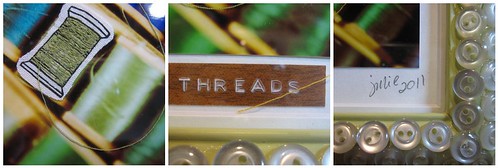The girl had a friend over the other day. After they were done reassembling cars and tormenting kittens, they went outside and dug up ants and worms for two hours. I checked in on them periodically, only to be told things like "we're helping the worms give birth" and "here's the egg sac".
I'm not even sure what they were using as dissection tools, but I'm pretty sure that the "egg sac" was some part of the worm's digestive tract.
At least they weren't eating them.
There is a little piece of me, the usually dormant compulsively tidy piece, that gets irritated when she digs up worms in the middle of our not very stable lawn-on-a-hill, or builds forts with sticks woven through newly planted shrubs. But I bite my tongue a lot, because really? I like that she's outside communing with nature and making hosta leaf boats for ants and acting as midwife to worms. Digging in the dirt, learning to fish, planting seeds - it's all part of keeping her connected to the earth, something that is incredibly important for lots of reasons.
When I was a kid, we spent hours and hours outside every day. There was an undeveloped lot behind our house, with a secret clearing and lots of trees to climb. There were kids to play with, one of whom had a rudimentary zip line in the backyard, others with rhododendron forts or jungle gyms. We had a radius of a couple of blocks - and when my mother blew the whistle, it was time to go home.
Too often these day, it seems like kids just don't go outside. It's too hot, or the TV beckons, or there's a violin lesson, or there's too much traffic, or there's no dirt around. Or something. What it boils down to is not enough unstructured play time, where you just figure out what to do.
I just read Grow the Good Life . I'd downloaded a Kindle sample based on the New York Times book review, and liked the sample so much that I bought a hard cover copy. It's a rant - it's not a "how to" book, it's a "why" book. Oh, there are a few tips - like, mulch early and often - but mostly it's get outside and garden because it's good for you, and your kids, and the earth. In the chapter about children - the author, Michele Owens, has three pesky kids - there's reference to "nature-deficit disorder", a term coined a few years ago by Richard Louv. Louv says, in his book Last Child in the Woods
. I'd downloaded a Kindle sample based on the New York Times book review, and liked the sample so much that I bought a hard cover copy. It's a rant - it's not a "how to" book, it's a "why" book. Oh, there are a few tips - like, mulch early and often - but mostly it's get outside and garden because it's good for you, and your kids, and the earth. In the chapter about children - the author, Michele Owens, has three pesky kids - there's reference to "nature-deficit disorder", a term coined a few years ago by Richard Louv. Louv says, in his book Last Child in the Woods :
:
Reducing that deficit - healing the broken bond between our young and nature - is in our self-interest, not only because aesthetics or justice demands it, but also because our mental, physical, and spiritual health depends on it. The health of the earth is at stake as well. How the young respond to nature, and how they raise their own children, will shape the configurations and conditions of our cities, homes - our daily lives.
For me, reading either, both, of these books was a little like preaching to the converted. We're doing a lot to keep the girl grounded, metaphorically and physically. But still, it's good to have positive articulated reinforcement for things that I feel strongly about.
I'm sending the kid outside again (as soon as it stops raining anyway). By the end of the summer, we may have no ants left. No child left inside, no ants left outside. Win, win, win.



















